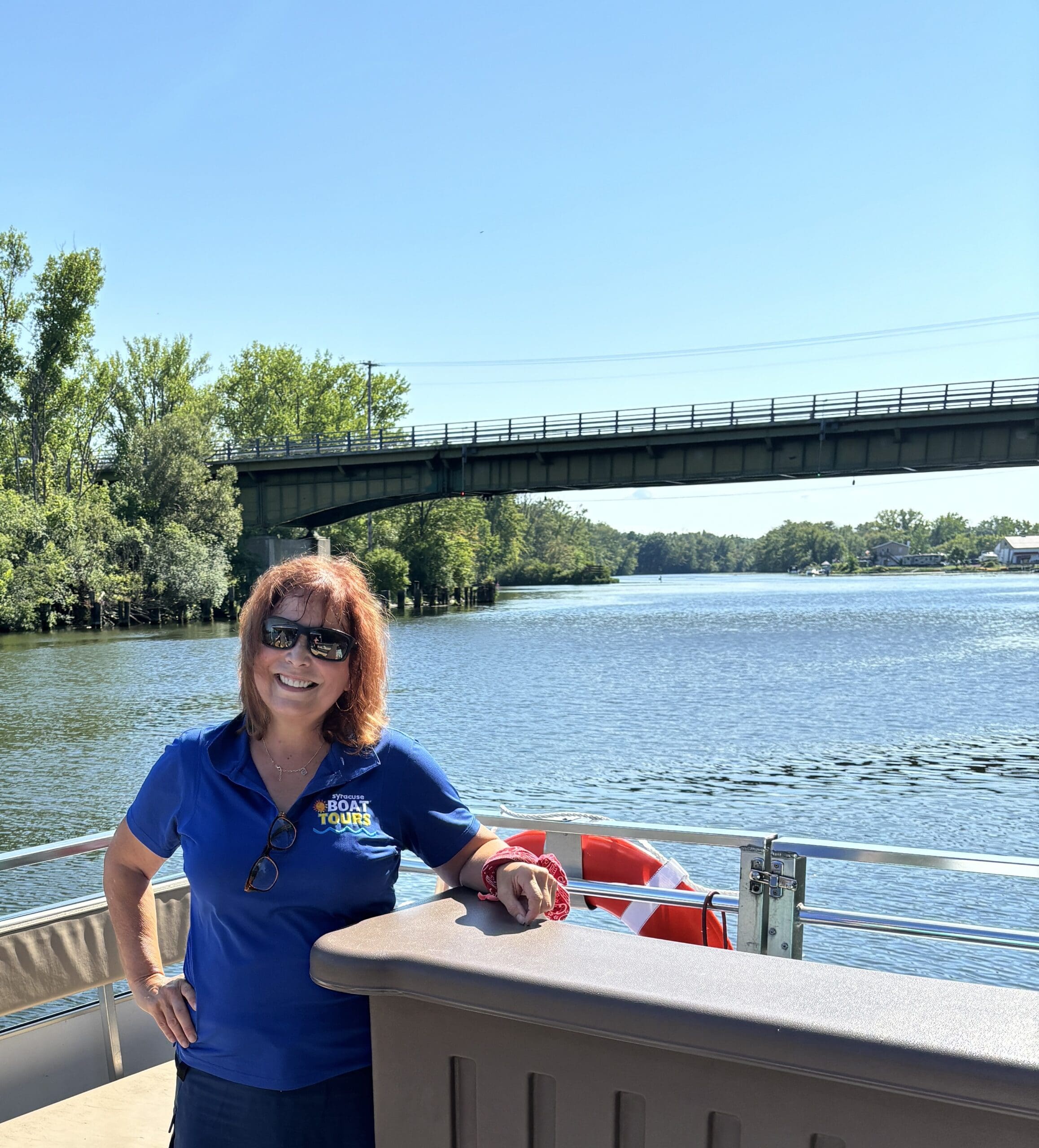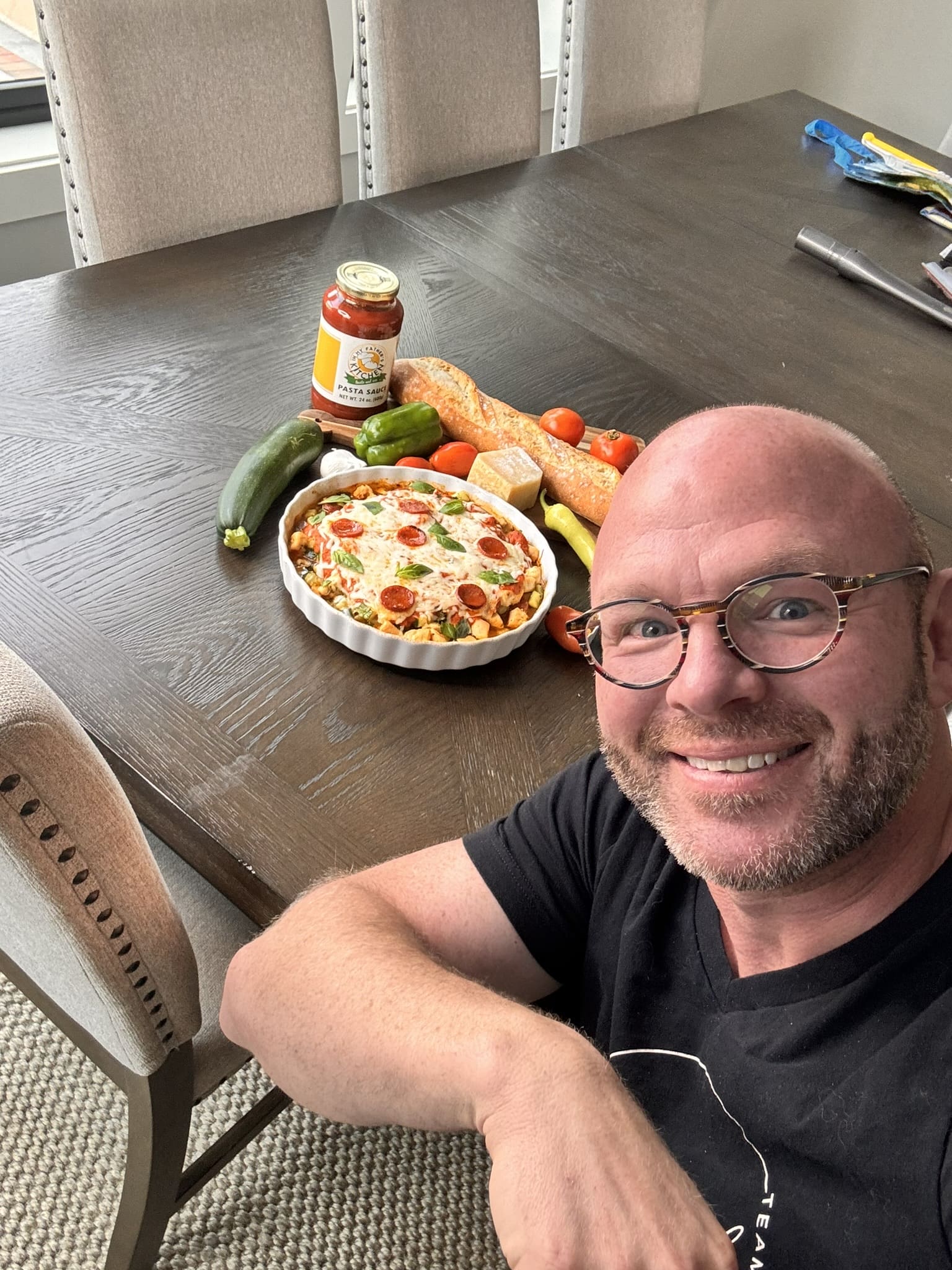How to Be a Man
By Lorna Oppedisano | Photography by Alice G. Patterson
It was just another normal night. George Kilpatrick was driving down 481, when suddenly, an idea struck him. He’s been in media for decades — radio and television — but that night, he had an inspiration for a new show. It was given to him, he said.
“I received a message from God, I believe,” George said, “that there was a need for a conversation around uplifting positive contributions, particularly for the African-American community, in a climate where that information wasn’t readily available.”
A transplant to Syracuse, George has been initiating conversation and creating platforms for healthy dialogue from his first years in town as a student at Syracuse University to his current position as radio host and Men’s Outreach program coordinator at Vera House.
“I believe in lifting every voice and making sure that under-represented voices are heard,” George explained. “And so that’s the way I’ve operated in the work that I do and the life that I’ve had.”
Meeting the community
Thinking back to his first semester at Syracuse University, George remembers a recordsetting snowfall, with a hearty laugh. Despite the brutal welcome to Syracuse’s seasons, he found a great community, and decided to stay.
Originally from New York City, George had expectations about the small Central New York city, he admitted. Raised by socially-conscious parents — his mother, “the No. 1 humanitarian,” and his father, “a straight-up activist,” he said — George expected Syracuse to be less progressive than he was used to.
But as George ventured off campus senior year for a research class, he got to know Syracuse better.
It was the early ’80s. The aim of the class was to work with the Urban League to report quality of life stories. With the opportunity to sit with people and learn their experiences and stories, George found a sense of community, with the AfricanAmerican community in particular, that connected him with his new home in a way he hadn’t expected.
“And it was also a way for me to understand that we all have the same dreams, goals and aspirations, depending upon the opportunities that we’re exposed to,” George said.
After he completed undergraduate studies, George worked in the banking industry for a while, and then eventually got a job at city hall as the director of minority affairs, a program aimed at providing opportunities for women- and minority-owned businesses in the community.
Seeing the good things government could do for its people, George wanted to build on his experience and learn more. Fourteen years after his first time at Syracuse University, he returned, this time to Maxwell School of Public Administration to earn a master’s degree in public administration.
Although his original aspirations included returning to government work, George was offered an opportunity in marketing. Having always been good with people and interested in business, he took it.
Then, after about four years, he turned his full-time attention to his passion: media.
The pull of media
“Being able to be a voice. Telling a story. Making sure that I talk about the issues that I’m concerned about. And being a progressive voice in a conservative-dominated industry, still to this day. I just wanted to be able to break stereotypes,” George said.
This is what attracted him to media. George’s first venture into the industry was in undergraduate studies at Syracuse University with work on public affairs radio shows.
Over the years, he dabbled in TV and radio, including a show centered around conversation with the mayor during his time in city hall, and a dance show called Syracuse Soul.
He started his full-time career in media at WCNY, where he used his voice and position to bring issues and concerns to the table.
“And luckily, gratefully, through the time I was there, there was no issue, no story that I couldn’t tell, that we couldn’t bring to the air,” George said with a smile.
George was part of a number of different shows with WCNY, including Hour CNY, Access with George Kilpatrick, and a handful of special programming centered around public issues, including an AIDS documentary.
Returning to his radio roots, George produced and hosted a number of radio programs as well, including 20 years of The George Kilpatrick Show, and his most current show, New Inspiration for the Nation.
Getting inspired
With his years in media, George has earned a reputation of having a progressive voice — a title he welcomes with a proud smile.
And with that experience and position comes pushback. It comes with the territory, George explained with a chuckle.
“My thing is this: what I promoted on my show was respectful disagreement and dialogue,” George said. Sure, people won’t agree on everything. They’ll get angry. But at the end of the day, we’re all just passionate about the issues, he explained.
“What I’m concerned about today is that we’ve lost the ability to disagree and be able to work through that disagreement,” he said, stressing the importance of coming from a place of sincerity, truthfulness and respect.
While George has received a fair number of angry calls and letters — some of them anonymous — he’s also been approached by people who’ve remarked his words have made them think about situations and issues from a slightly different perspective.
With his most recent show, George hopes to promote a dialogue he thinks has always been an undercurrent of conversation, but not as overt as it should be.
“I wanted to show, especially [to the AfricanAmerican] community, that the success that they were looking for wasn’t new,” he explained. “It wasn’t an apparition.”
Some of his guests are local, and some aren’t, George said. His aim is to bring new voices and information to people, to give them access to “something really big.”
Growing up, George’s parents instilled in him ideas of success and greatness. But he knows not all people are lucky enough to have that influence in their lives. There’s a community of people here whose success isn’t always broadcast, he explained. He wants to show them this success of the African-American community is nothing new, as his parents taught him.
“It’s my obligation to make sure that I’m a conduit,” he said, “to make sure that I’m representing that voice.”
The reach of New Inspiration for the Nation has expanded beyond Syracuse. Now syndicated throughout the country, George’s voice reverberates into other states and communities.
On a recent trip to Las Vegas, one of the show’s broadcast locations, George was talking to his friends, when all of the sudden, a stranger walked up to him and said, “I thought I heard you and recognized you!”
“I was like, ‘This is good! This is good,’” he said.
In a political climate that tends to polarize people, George often asks the question, “What now?” to his guests. Their answers align with George’s mission of creating a space for dialogue and bettering the community.
It doesn’t mean you stop fighting and helping those who might not have a voice, he said. It means you fight for everyone’s access to vote, and place at the conversational table, all while continuing to care for your community and family, he explained.
“So I think that’s what our message has always been,” he said. “We’ve still got to do our work. It doesn’t stop.”
Becoming an ally
Back in his days at WCNY, George created a lifelong ally: Vera House.
His goal of shining a spotlight on under-represented voices included sparking conversation about domestic violence and sexual assault.
The two organizations partnered to produce a couple of halfhour specials about domestic violence. In response, George received an email he’ll never forget.
George remembered reading that day: “Thank you for that. I did not realize that I was in an abusive relationship, or at least I tried to convince myself that I wasn’t in an abusive relationship, and then you showed me the signs. And I am with someone who is very prominent in the community, and here I am, wearing the mask, walking around.”
Another powerful segment George helped produce at WCNY included conversations with the perpetrators themselves. It served as a vehicle to educate others, in showing how the problems could begin and escalate, he explained.
In 2009, his role with Vera House grew when he was asked to be an honorary co-chair of the White Ribbon Campaign, a monthlong effort to raise awareness about domestic violence and sexual assault.
Then, in 2012, the position of program coordinator for the Men’s Outreach program opened up, and Vera House asked George if he would consider taking it. Already familiar with the organization, not to mention being a lifelong advocate of highlighting important social issues, George was a perfect fit.
Through a Department of Justice grant — the third of its kind granted to Vera House, this time for a three-year period — George leads a variety of workshops and training for men and boys, to help them understand the role they can play in ending domestic violence and sexual assault. The theme interwoven into most of George’s work — dialogue — plays an important role in his mission with the Men’s Outreach program.
The challenge of the job barely ever lies in the discussions themselves, George explained; it’s getting men into the room that’s most difficult.
Most men aren’t assailants. So when they hear a conversation about domestic violence and sexual assault, they assume, “Well, that has nothing to do with me.”
“But what we’re asking men to do is … take a leadership position. Because while maybe you’re not a perpetrator — we know most men aren’t,” George said, “what about your mom? What about your sister? What about your partner? What about any woman who’s in your life who could be potentially a victim?”
Through a variety of programs, ranging from mentorship in schools to partnerships with area organizations, the Men’s Outreach program looks at topics like masculinity, consent and respect.
Once they get men or boys into the room, the walls come down, and the participants often feel vulnerable enough to open up and speak freely in honest dialogue, George said.
“And they’re free to be challenged around some of their own behaviors and some of their own actions,” he said.
What it means to be a man
In a society that’s historically patriarchal, the Vera House Men’s Outreach program conversations are important. Most organizations are open to helping facilitate these conversations, but there are still barriers, George said. Some of the resistance to the work might be due to people’s fear of letting go of that patriarchy, he hypothesized.
There’s nothing wrong with the “tough guy,” “John Wayne” version of masculinity, he explained, as long as you’re not using it as a weapon.
“What we’re saying is that’s OK as long as you’re not making me have to be that, too,” he said. “We’re saying that there’s different degrees of what a man looks like, and that I shouldn’t have to conform to one notion of that.”
George stressed that these conversations are important for any man in any situation.
In raising their four children, George and his wife made sure to stay conscious of room for discussion. The best example is how they interact, George said with a fond smile covering his face.
Looking to the future, George is excited about the potential the Men’s Outreach program has in the community. And — ever that progressive voice — he challenged any men reading this who might think Syracuse Woman Magazine has nothing to do with them to think again.
“Because if you care about the women and girls in your life, then we’re challenging you to step up and be a leader in their lives and in your life, with the people that you run with,” he said. “Because that’s where you can have the most impact. Start where you are.” SWM
For more information about Vera House, visit verahouse.org. For more on George Kilpatrick, visit georgekilpatrick.com.





